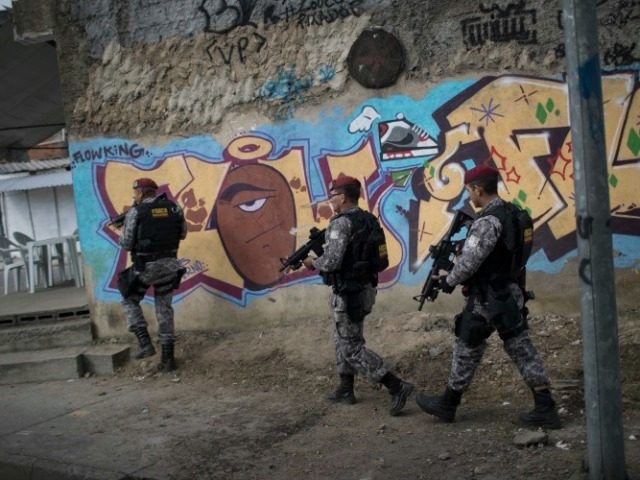A Brazilian soldier was shot dead in Rio de Janeiro this week after his GPS led him to the notoriously violent Vila do Joao favela while the group attempted to navigate back to the Olympic Village.
Helio Vieira, 37, was in Rio de Janeiro to provide security for the Olympic Games. He and his colleagues strayed off the city’s main highway into the slum while wearing their uniforms, making them clear targets for the neighborhood’s violent drug traffickers. Three soldiers were shot, Vieira fatally in the head, as the truck they were driving took a spraying of bullets from a number of local criminals.
After a complex surgery Thursday to remove the bullet, Vieira did not survive. Justice Minister Alexandre de Moraes issued a statement lamenting his passing, calling the incident a “cowardly attack” and Vieira himself a “true hero of our country.” The nation has declared a day of mourning for him.
Vieira, his family told O Globo, had taken the job of working security at the Olympics in hopes of buying a new car. A native of northern, rural Roraima state, he had never been to Rio de Janeiro and was fascinated by both its expansiveness and the violence in its inner city communities.
“He said he thought the city was very complicated,” his sister told the newspaper. “We were concerned when we heard where he would be patrolling.” In an interview conducted before Vieira died, she added, “After this, I’m not sure he will ever want to go back to Rio.”
The general commander of the Military Police of Roraima, Col. Dagoberto Goncalves, clarified to the newspaper that “everyone knew what the mission was and did not complain.” Noting the expansive northern border in Roraima, he continued, “We are used to complex work.”
Two suspects have been arrested and at least one person killed in police raids in Vila do Joao, which the Brazilian newspaper O Globo notes does not typically enjoy police surveillance, and has been the site of a number of similar incidents in which outsiders accidentally ventured into the slum, only to be immediately shot at. Most such cases involved civilians.
Rio de Janeiro’s reputation for violence concerned many observers in the days leading up to the Olympics. After multiple occasions in which locals were shot by stray bullets while in the vicinity of drug-related gunfights, Brazil’s Secretary of Public Security José Mariano Beltrame told reporters there was little to be done regarding Rio’s favela culture. “Historically, unfortunately, that is how Rio de Janeiro is.”
Brazil deployed 85,000 soldiers to the Olympic Village to protect athletes and spectators from petty crime, terrorism, and aid in the containment of the Zika virus threat – twice the number of soldiers deployed for the 2012 London Olympics but less than half deployed earlier this year to eradicate the Zika virus.
Despite the large military and police presence in Rio for the Olympics, a number of high-level visitors, including athletes, have reported being the victims of violent crime. Portugal’s minister of education was robbed on Saturday leaving and Olympic cycling event. Two weeks ago, two Paralympians suffered the same fate. The head of security for the Olympic Games was also the target of a robbery, though his assailant was immediately shot to death by accompanying undercover police.

COMMENTS
Please let us know if you're having issues with commenting.